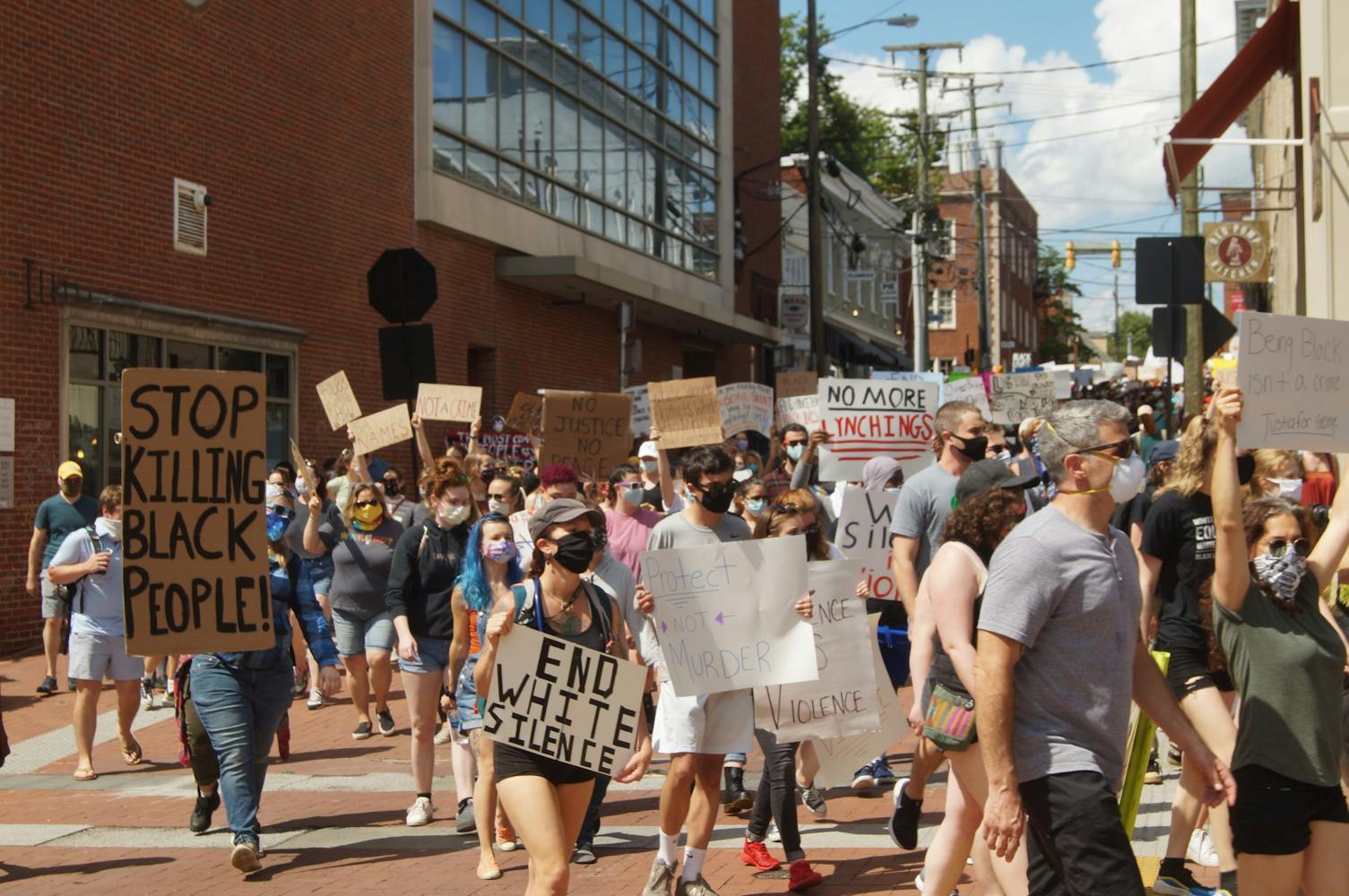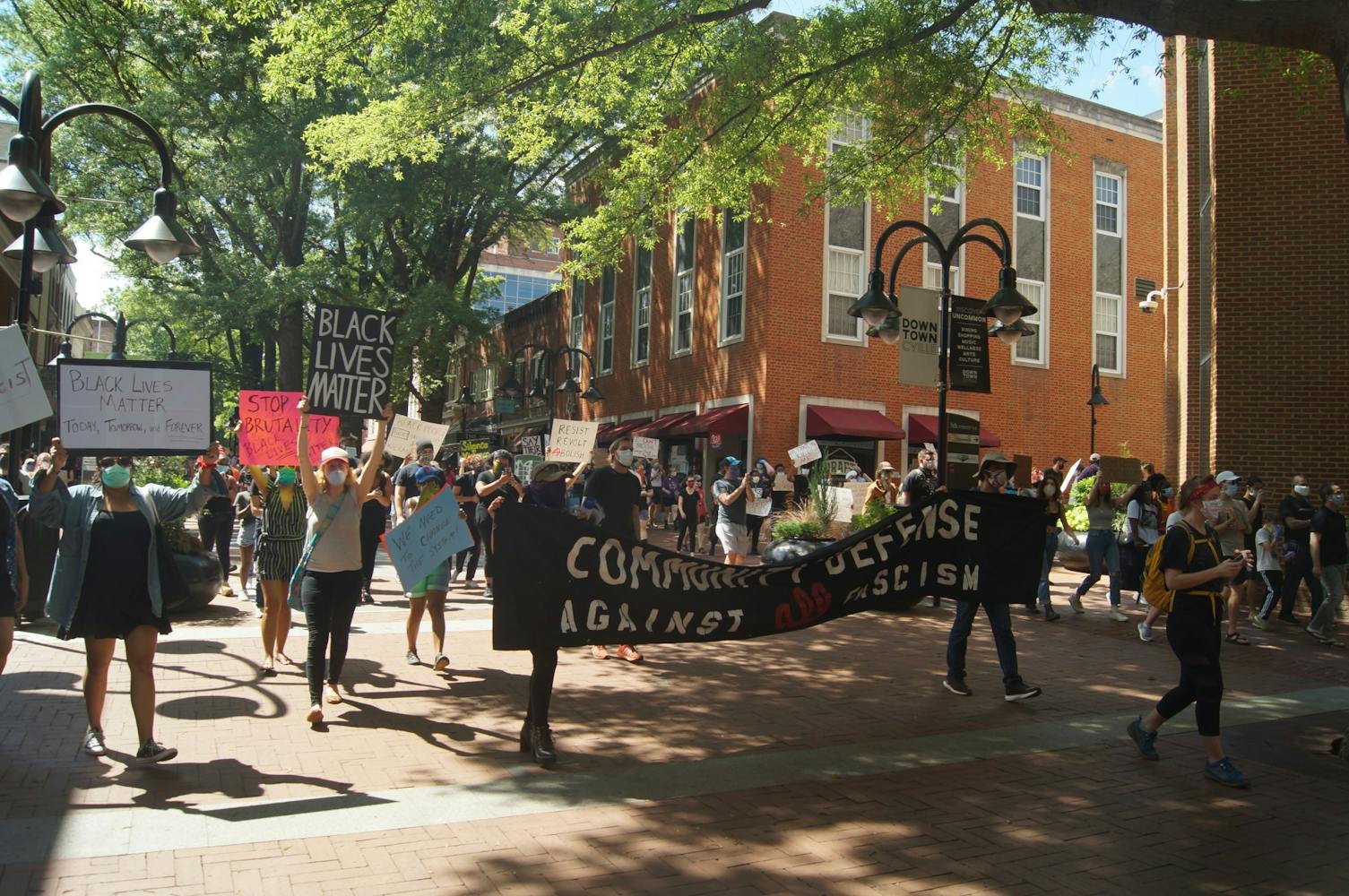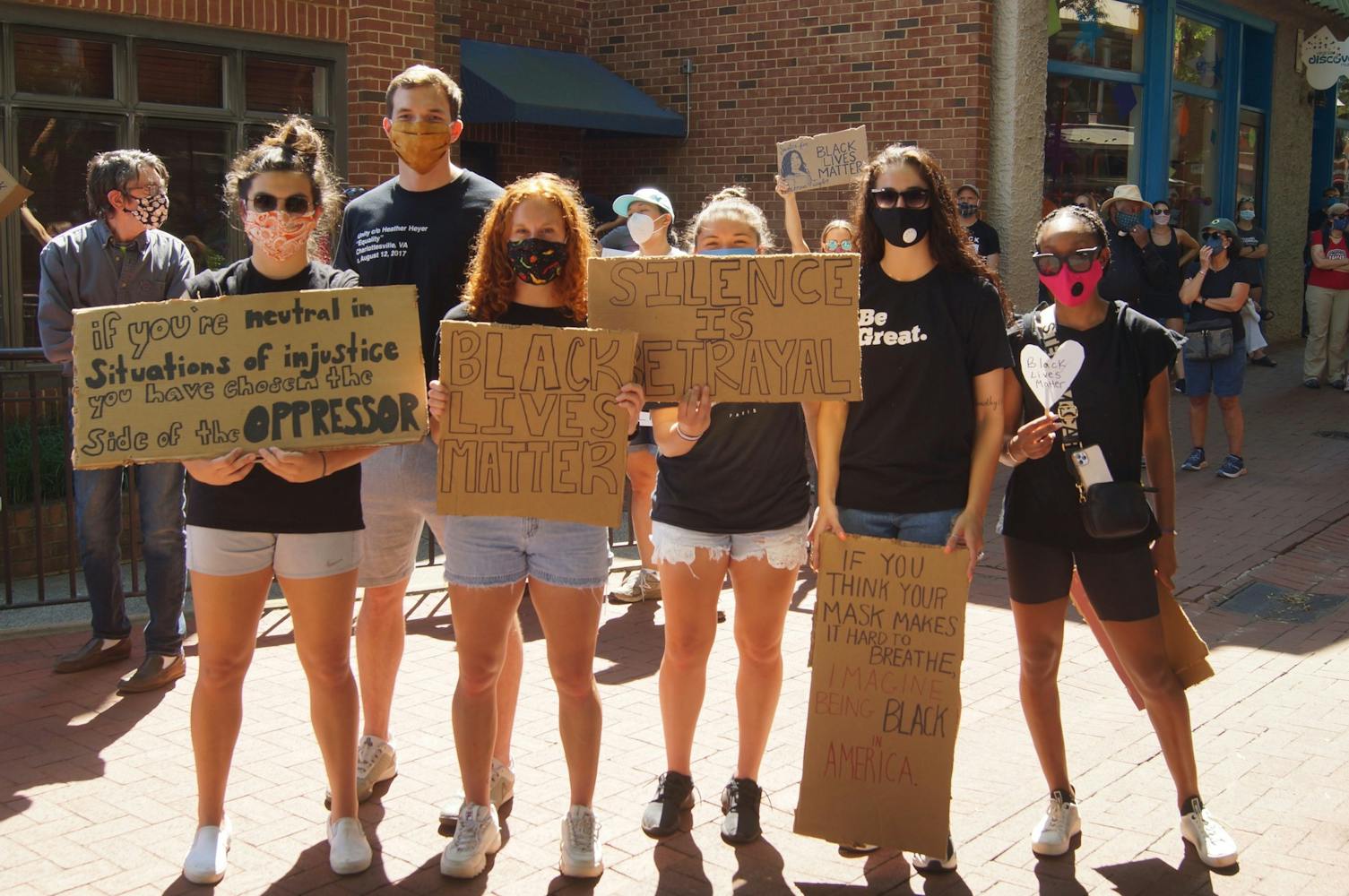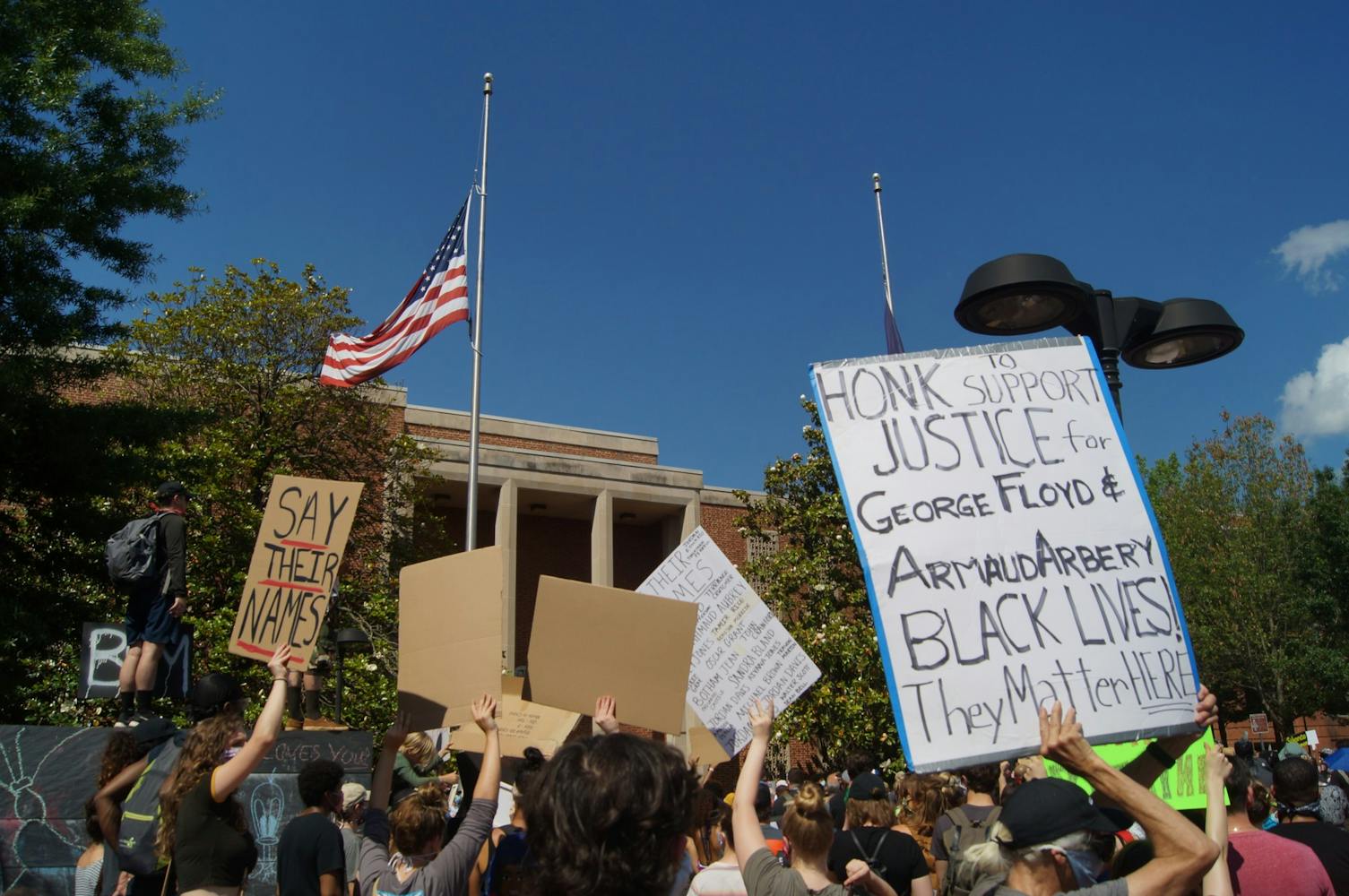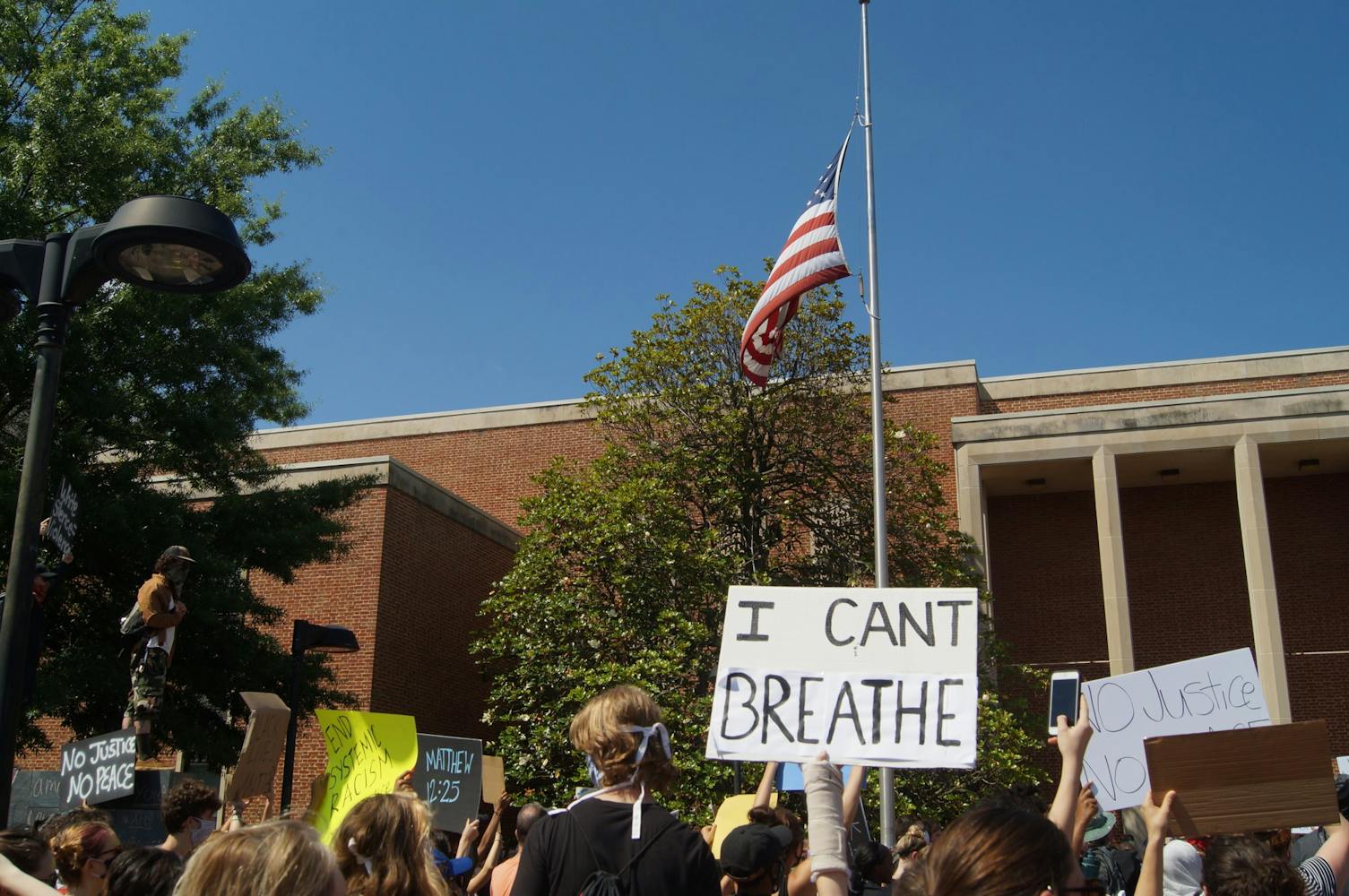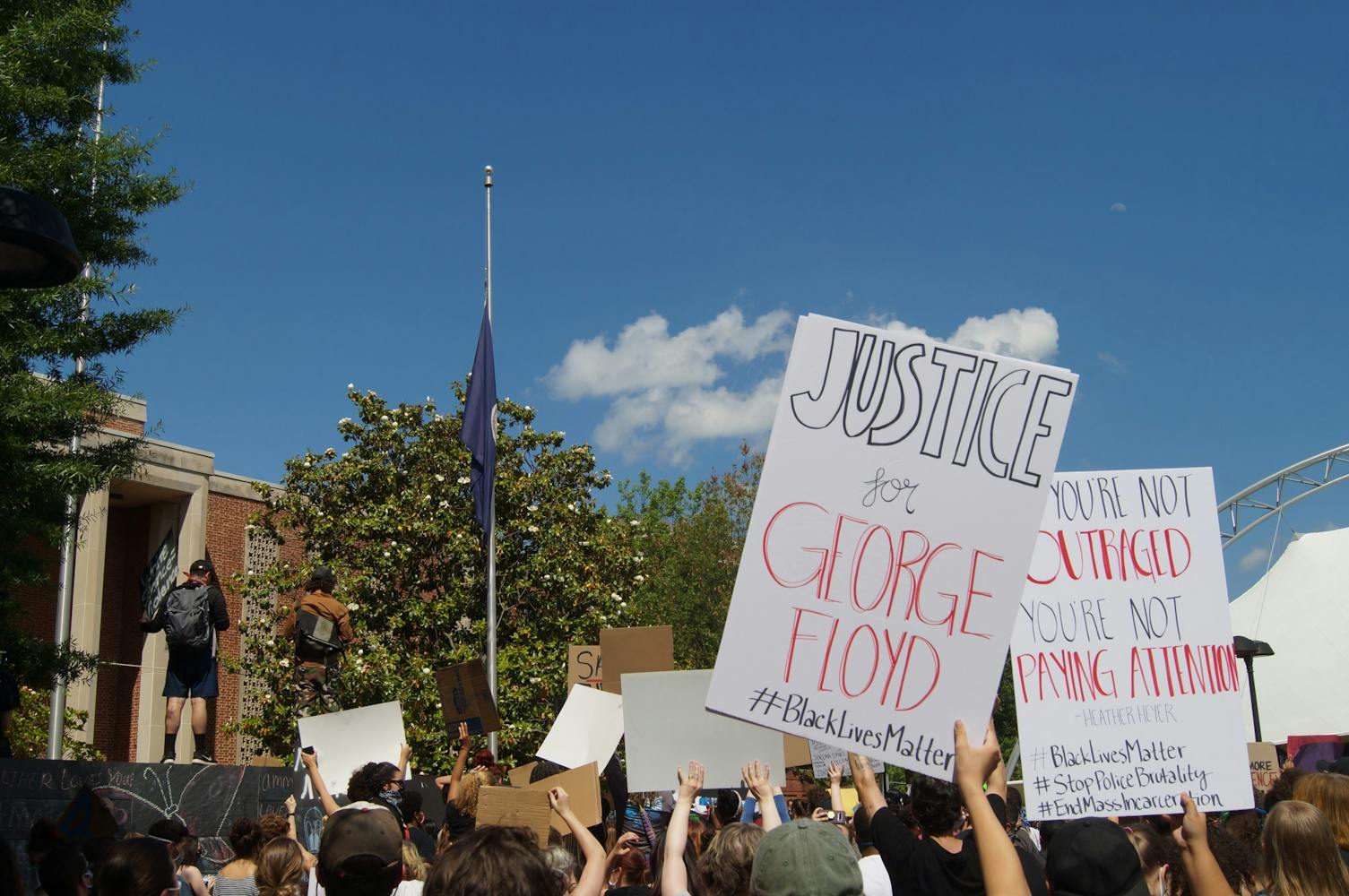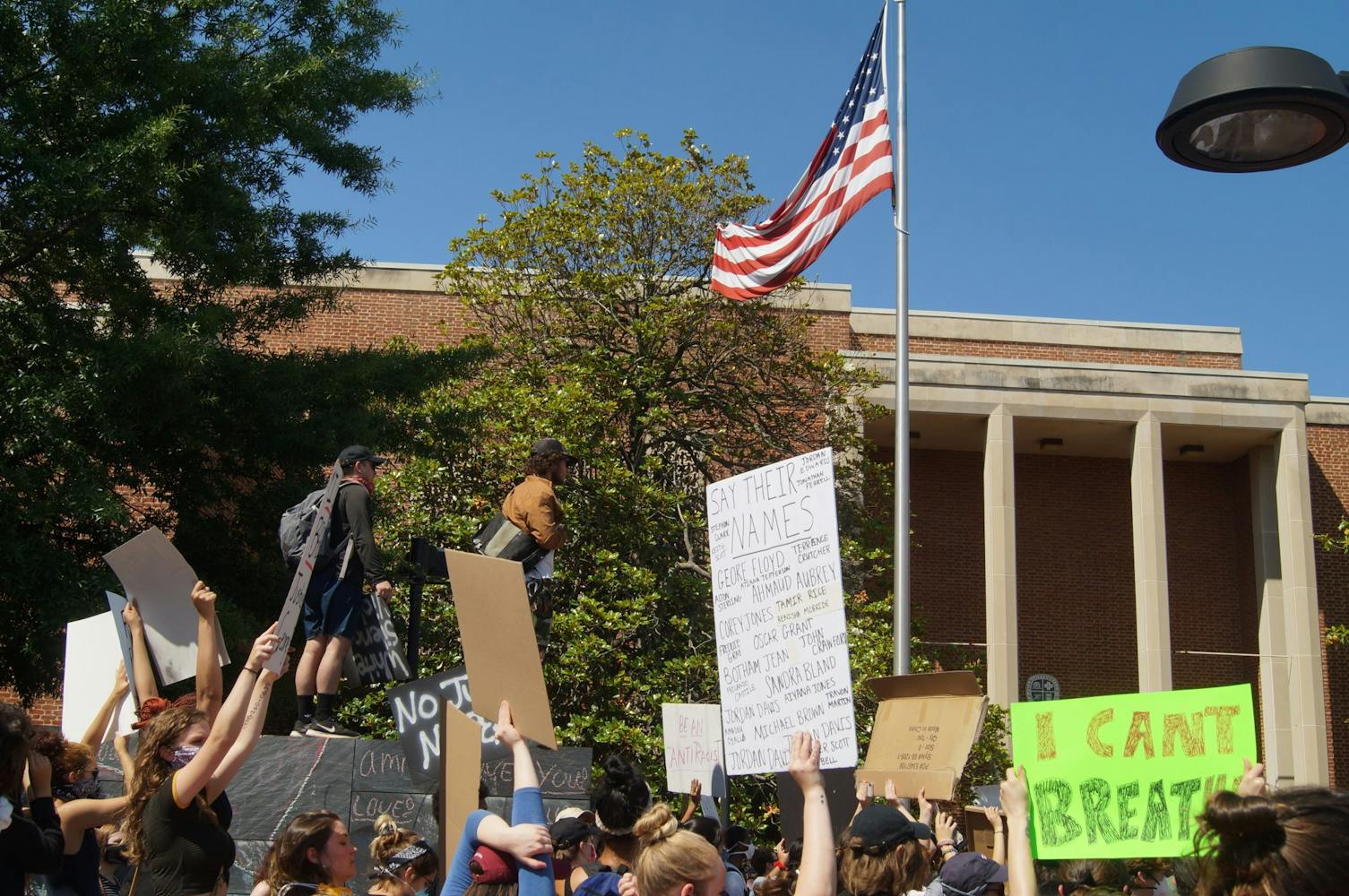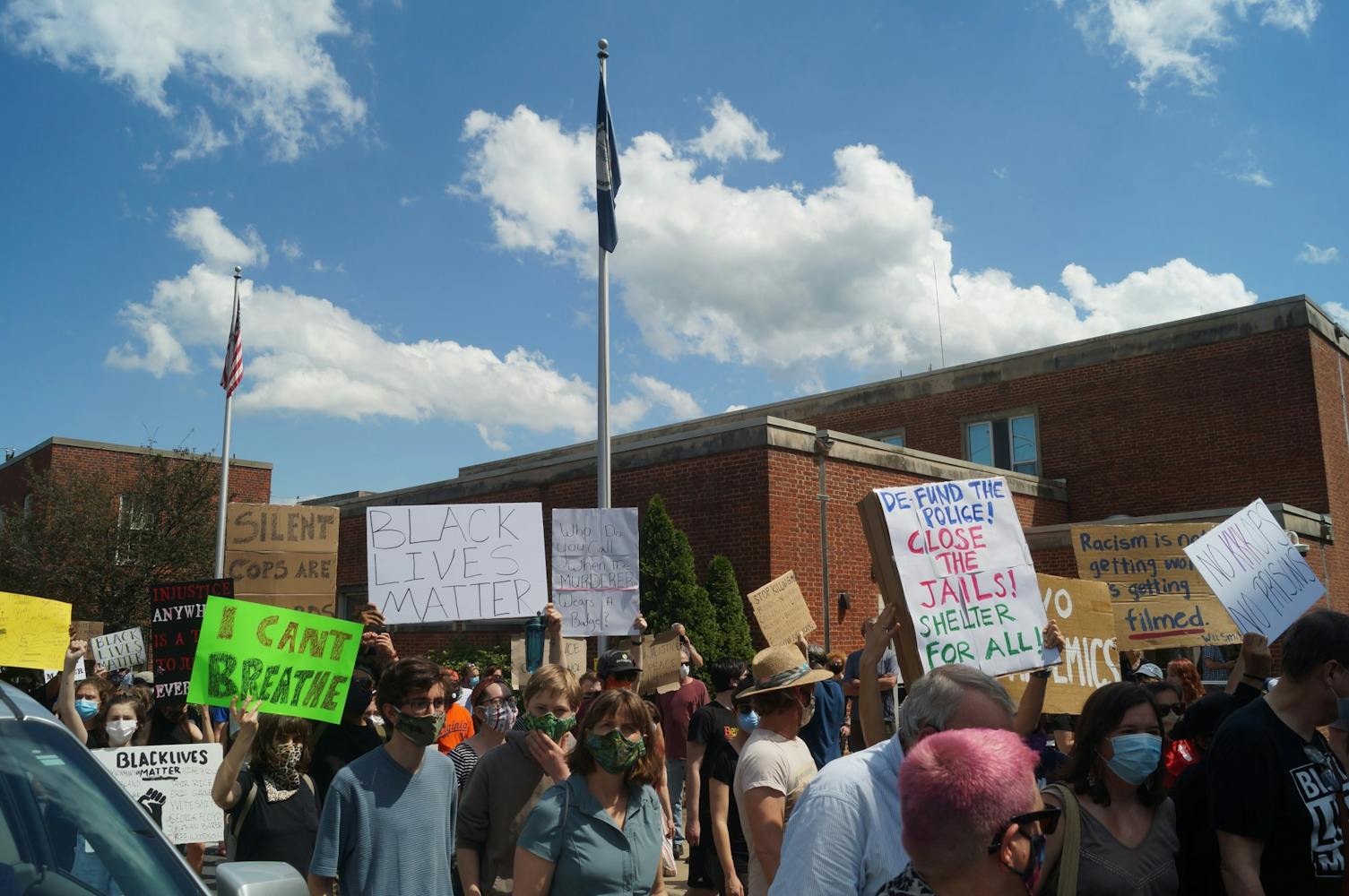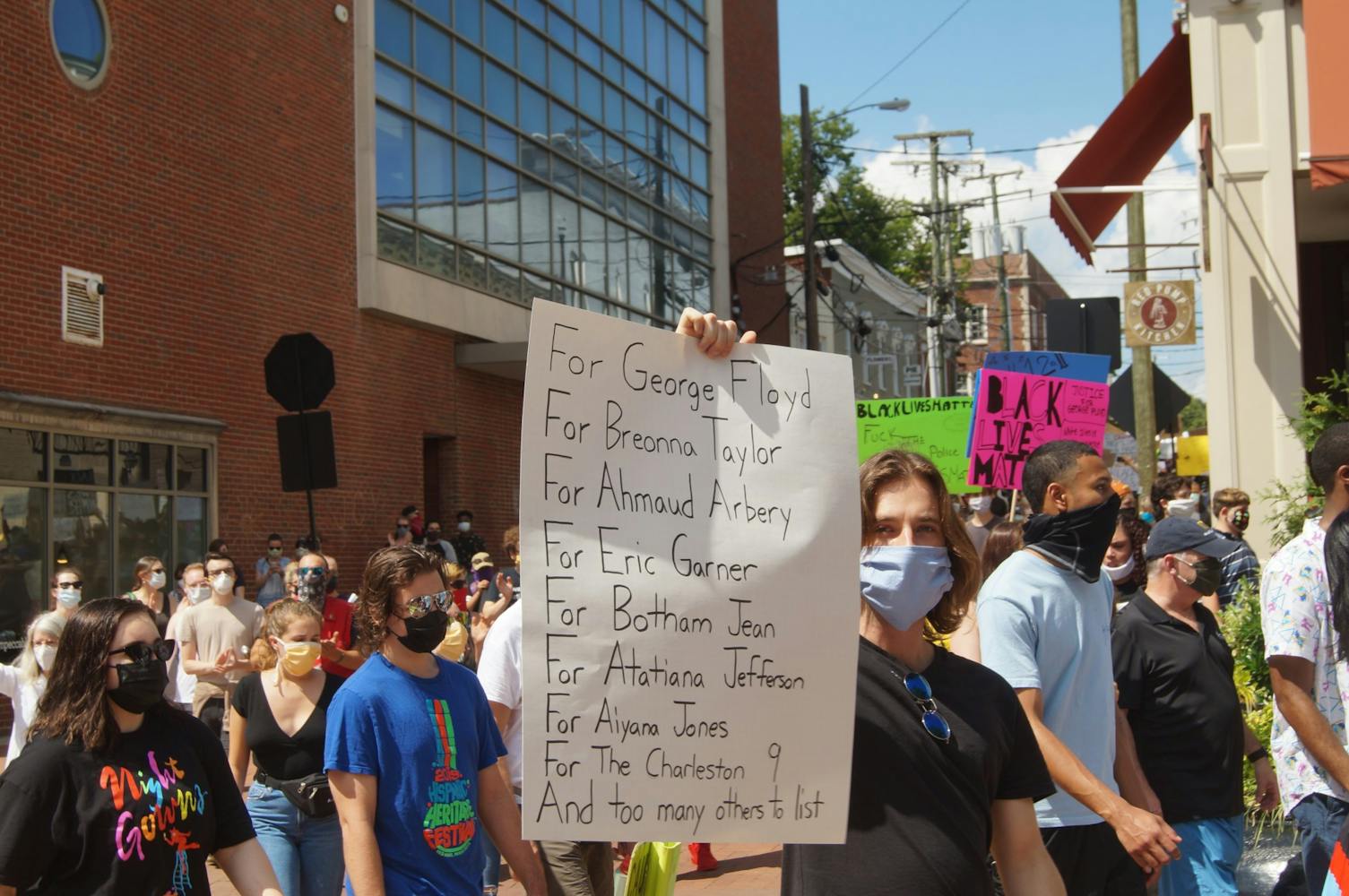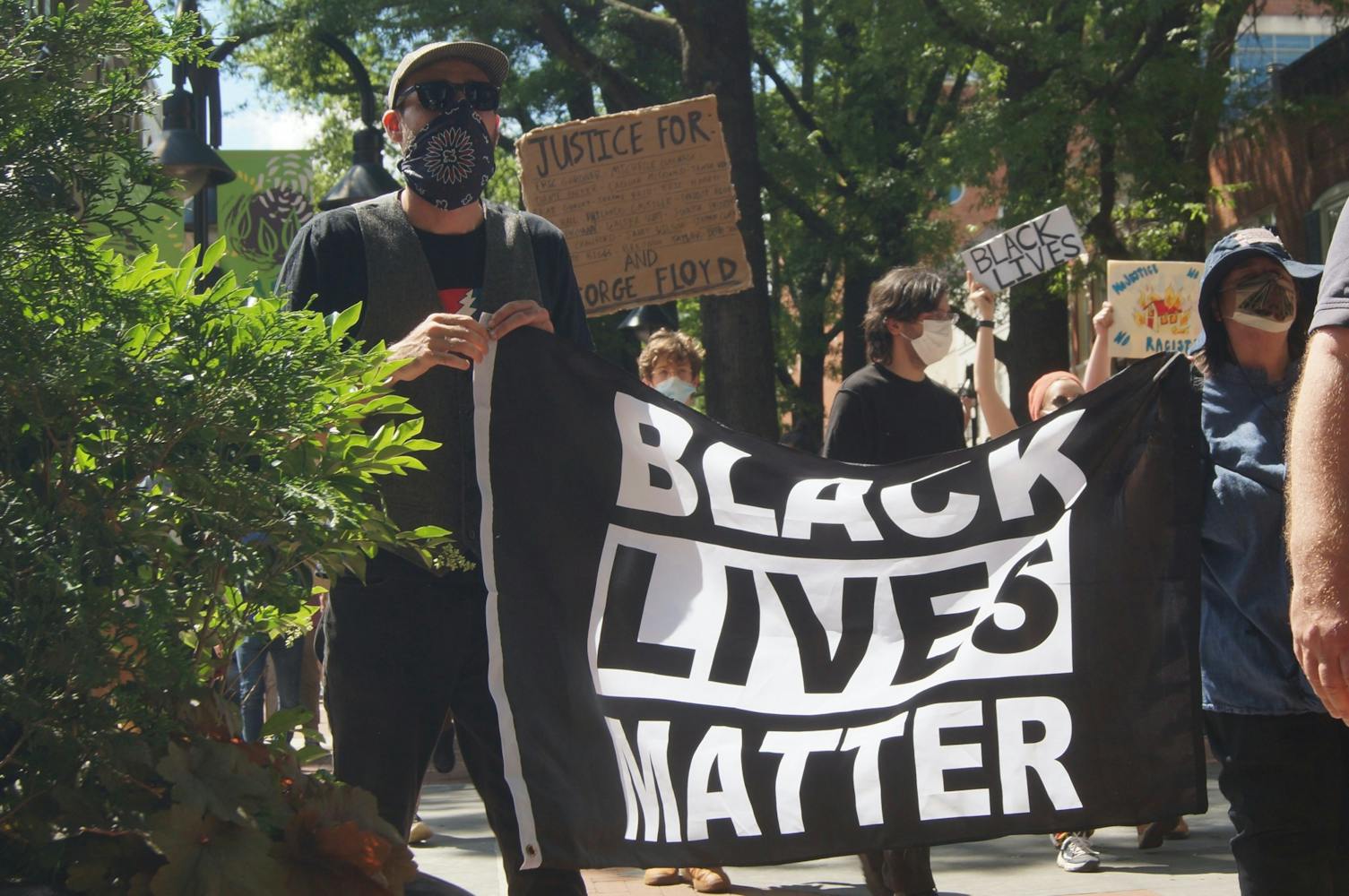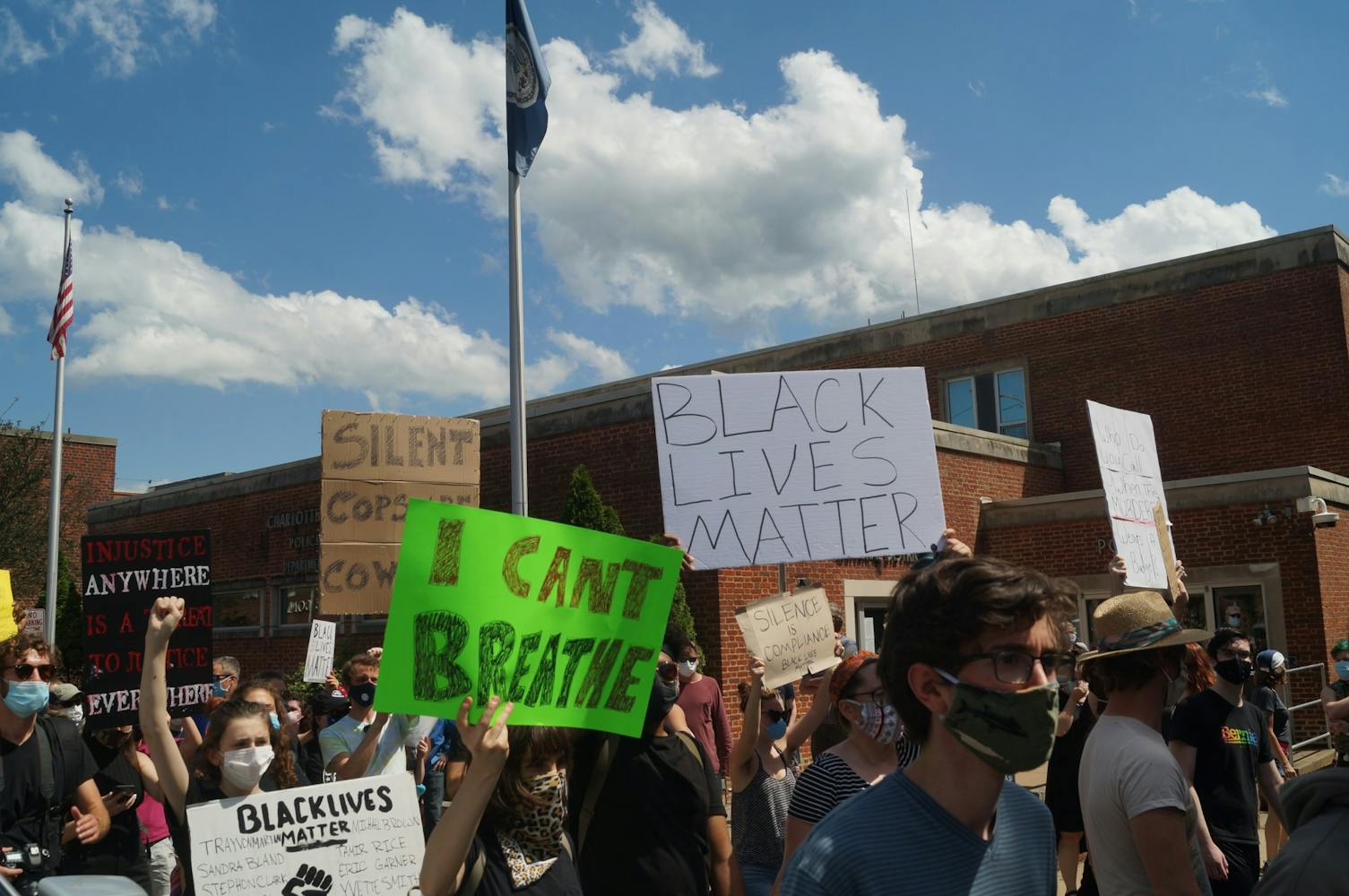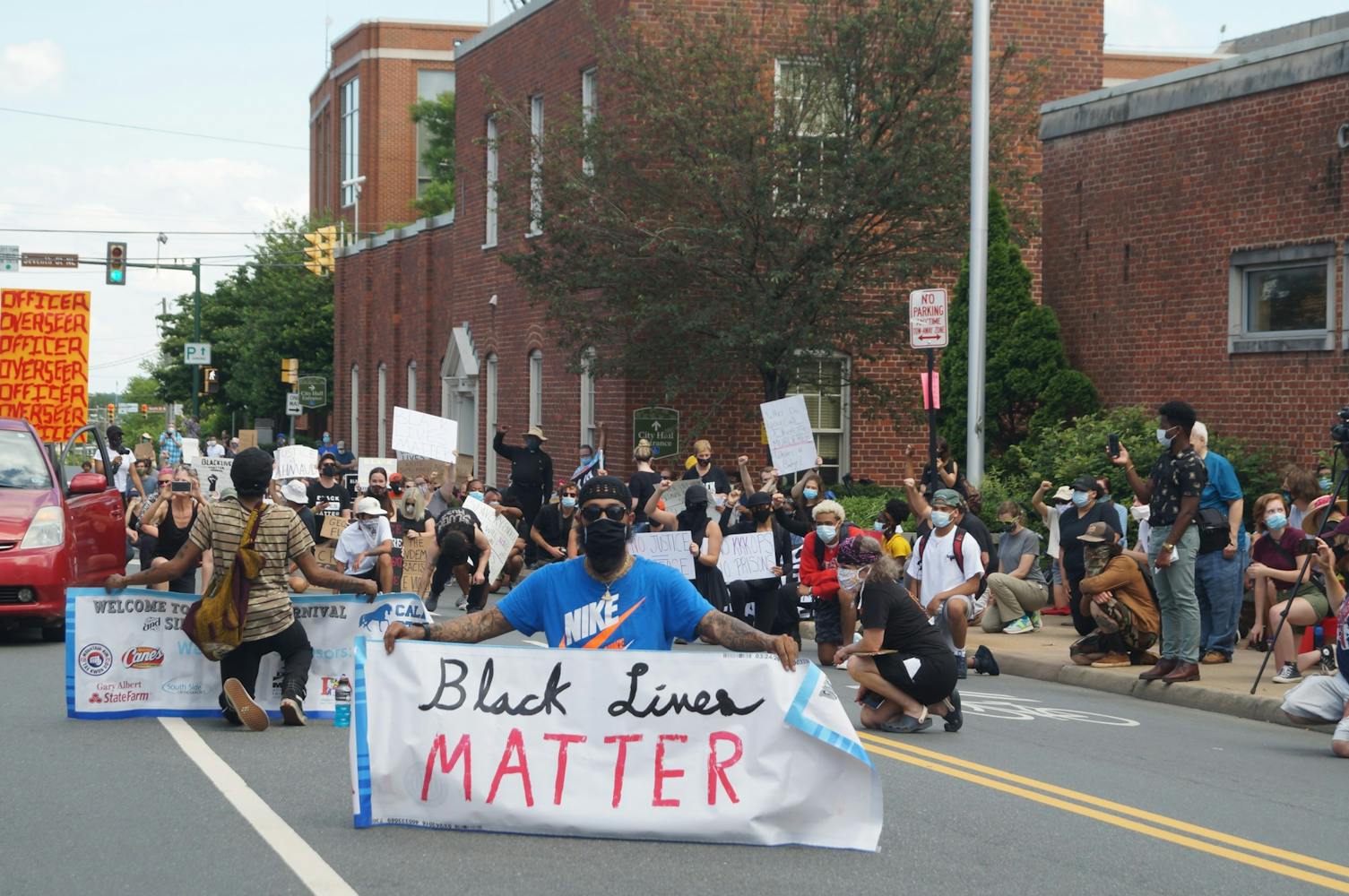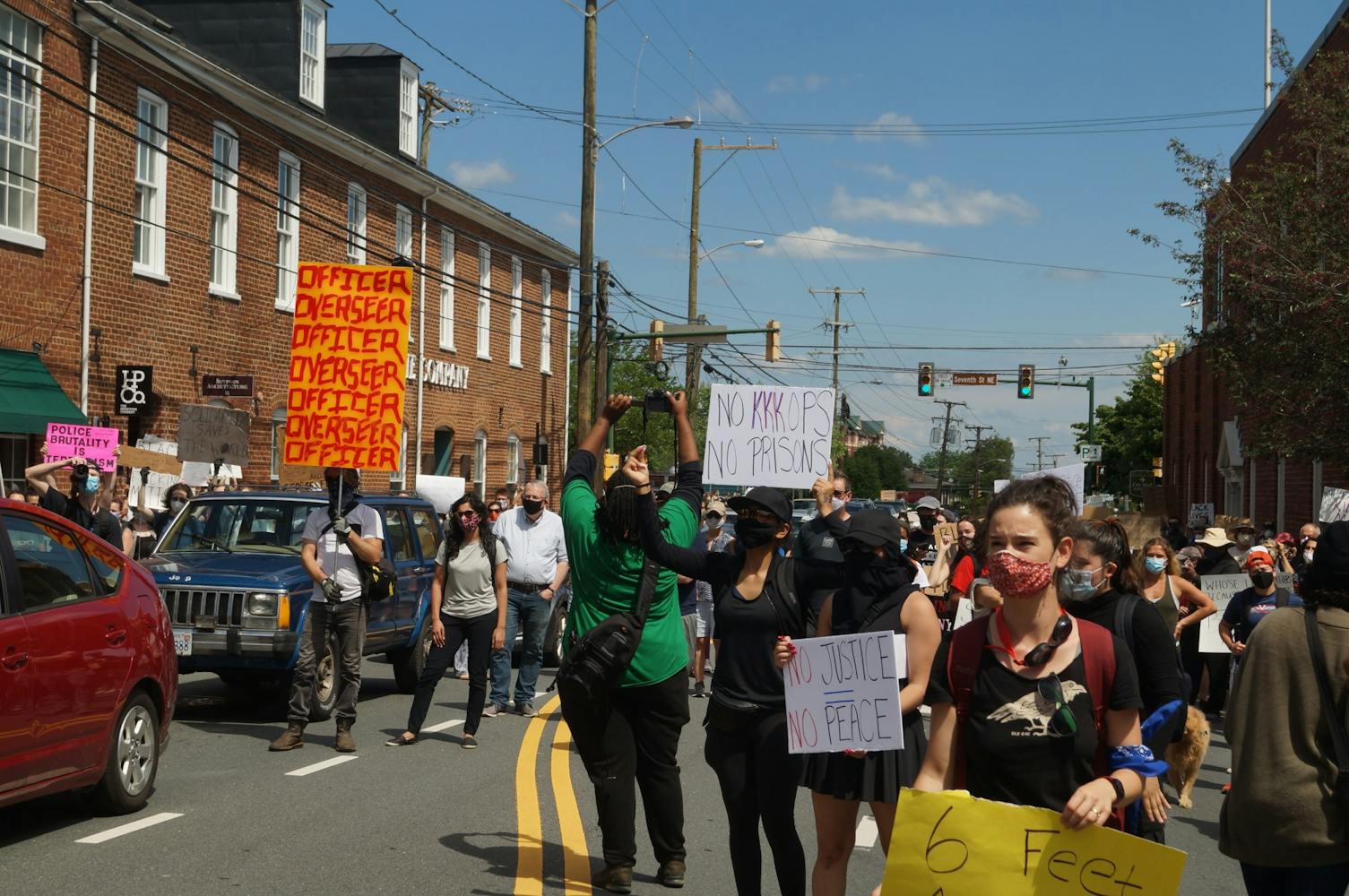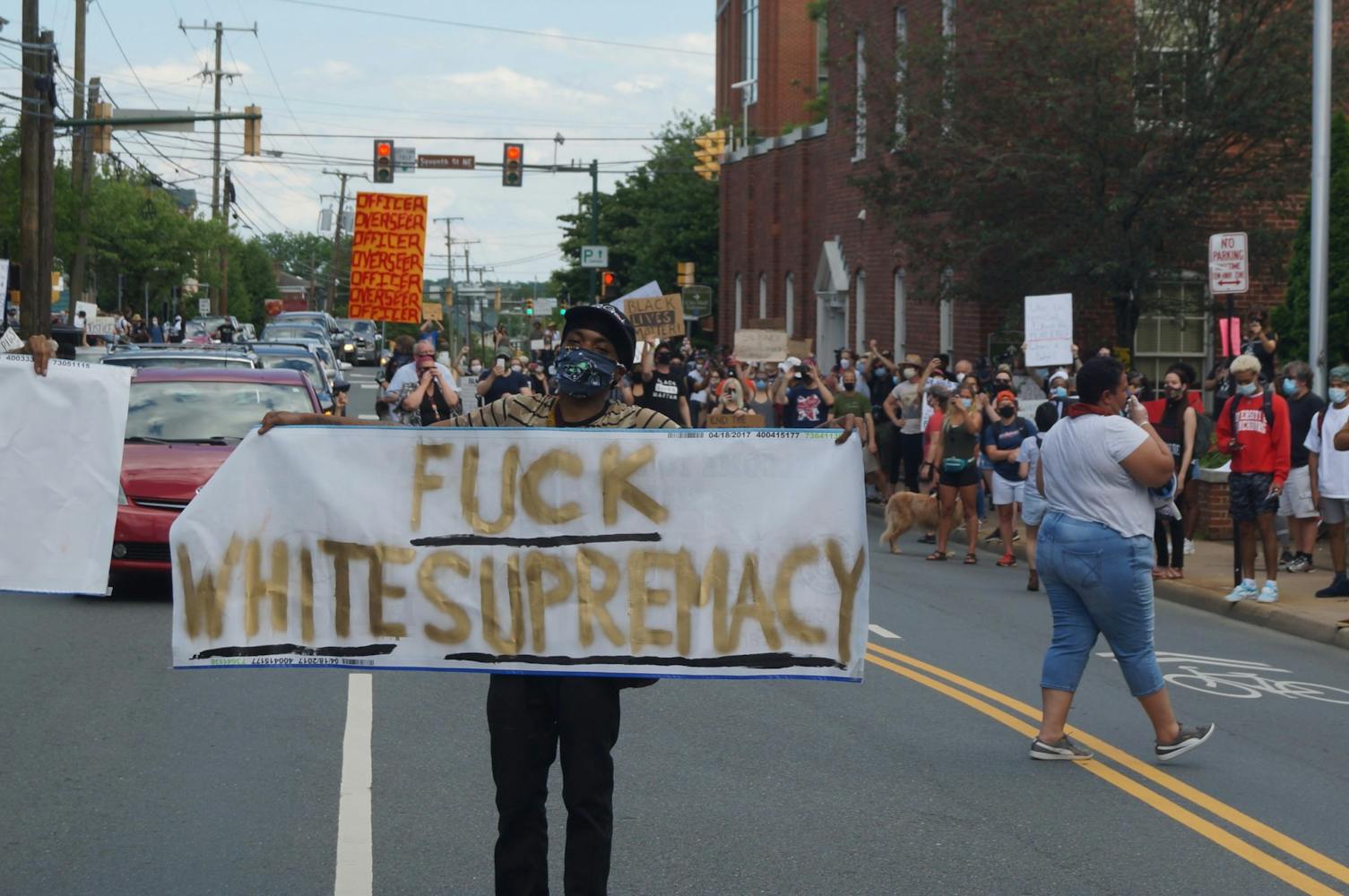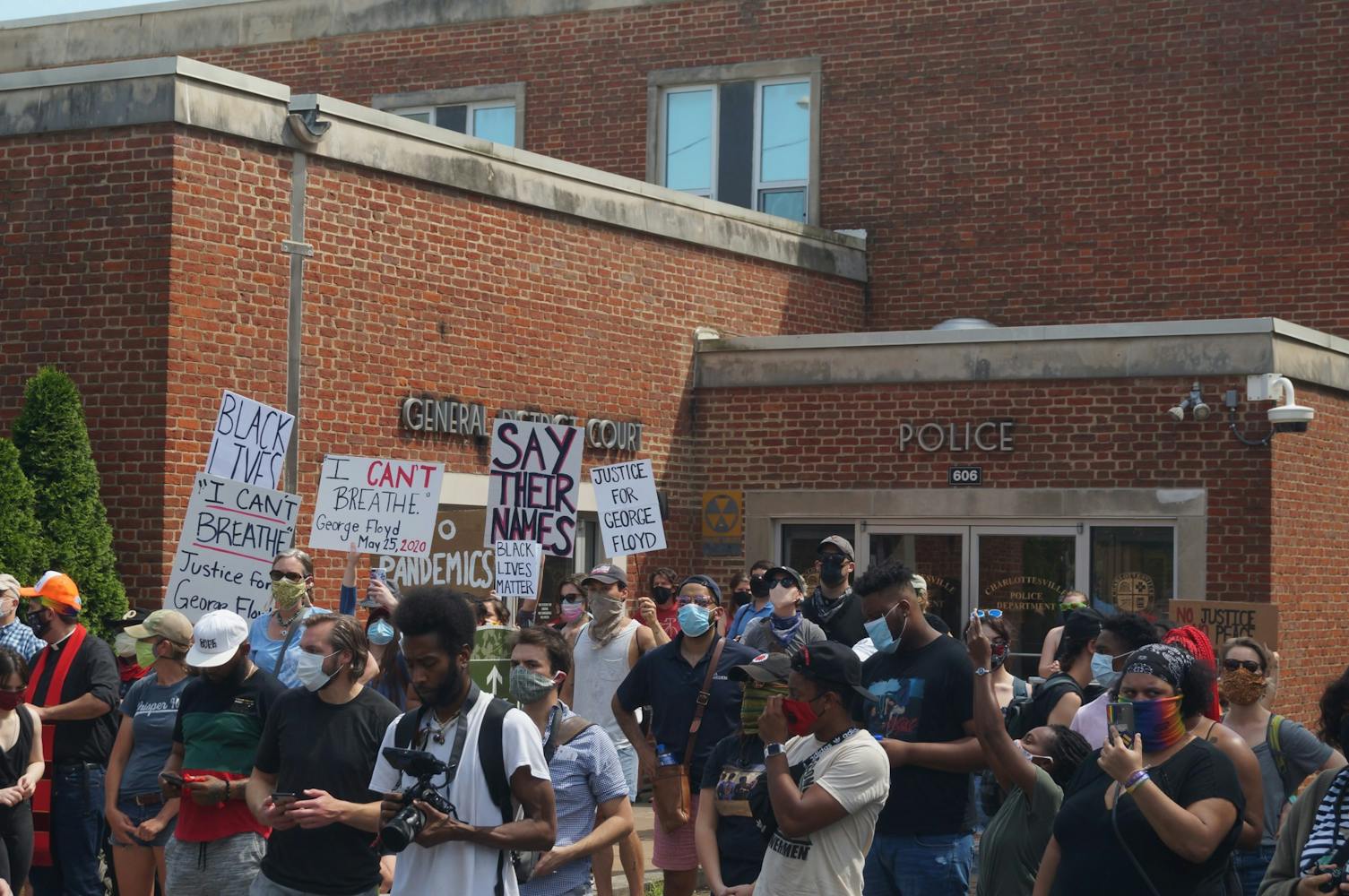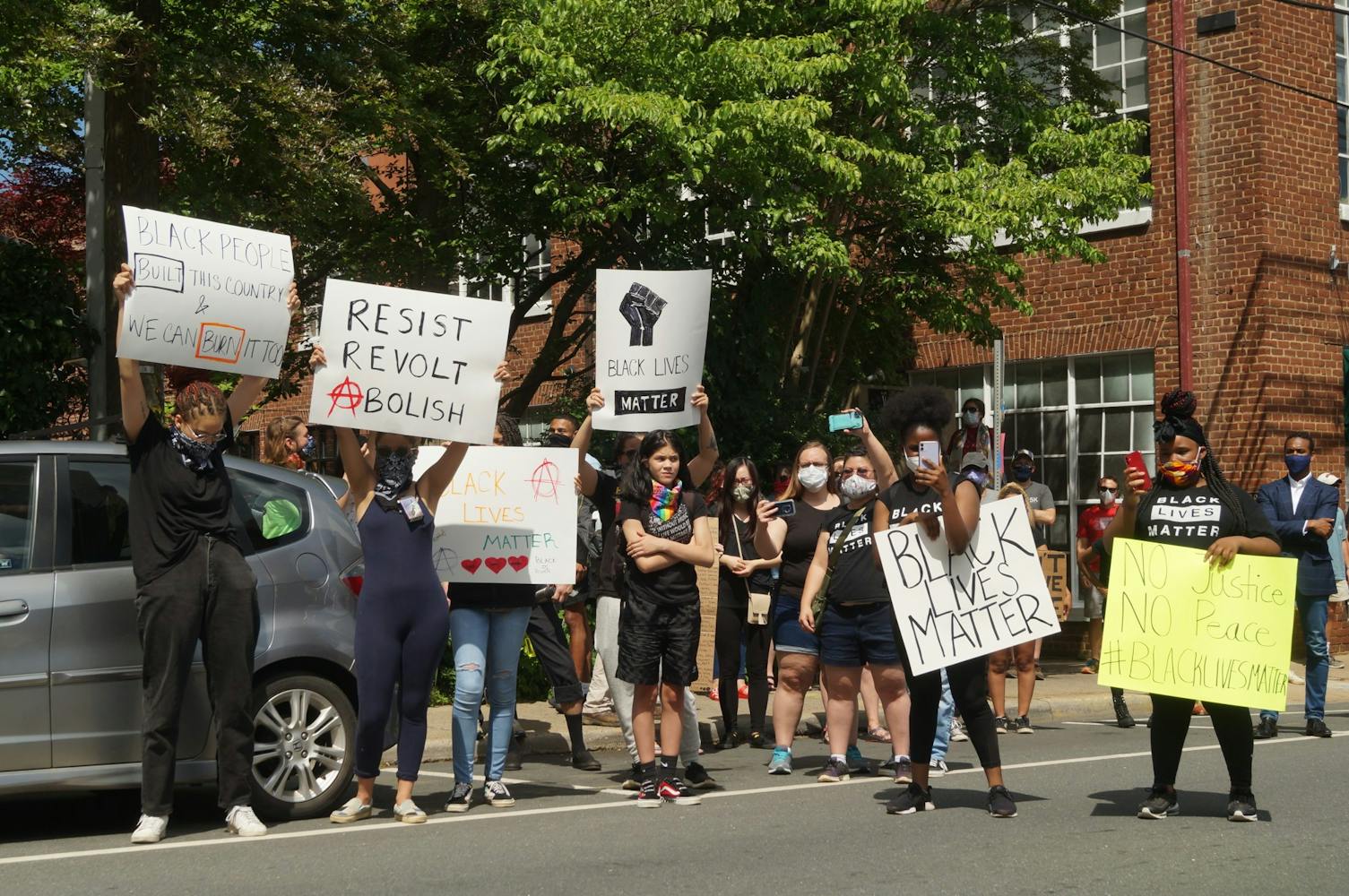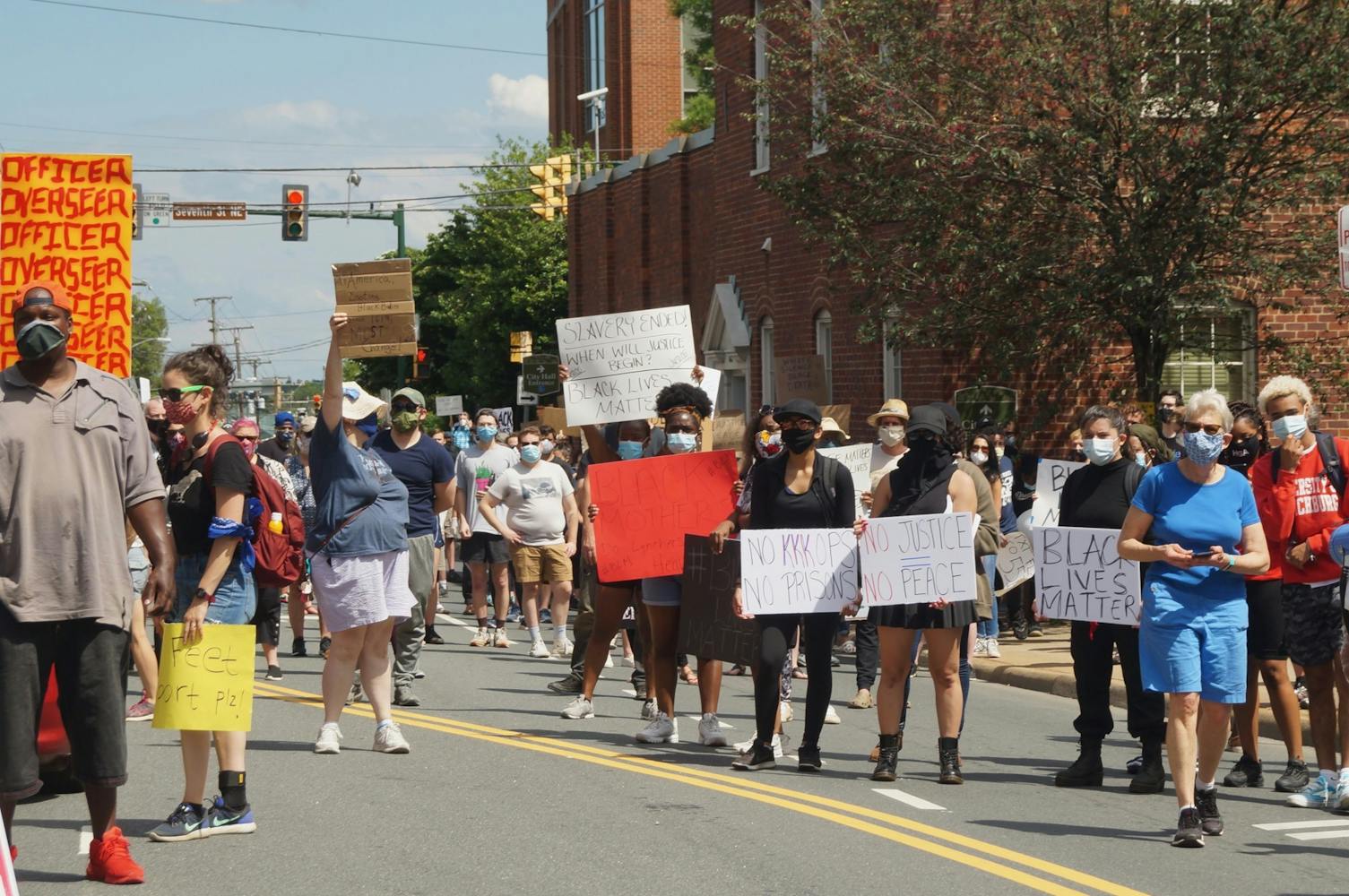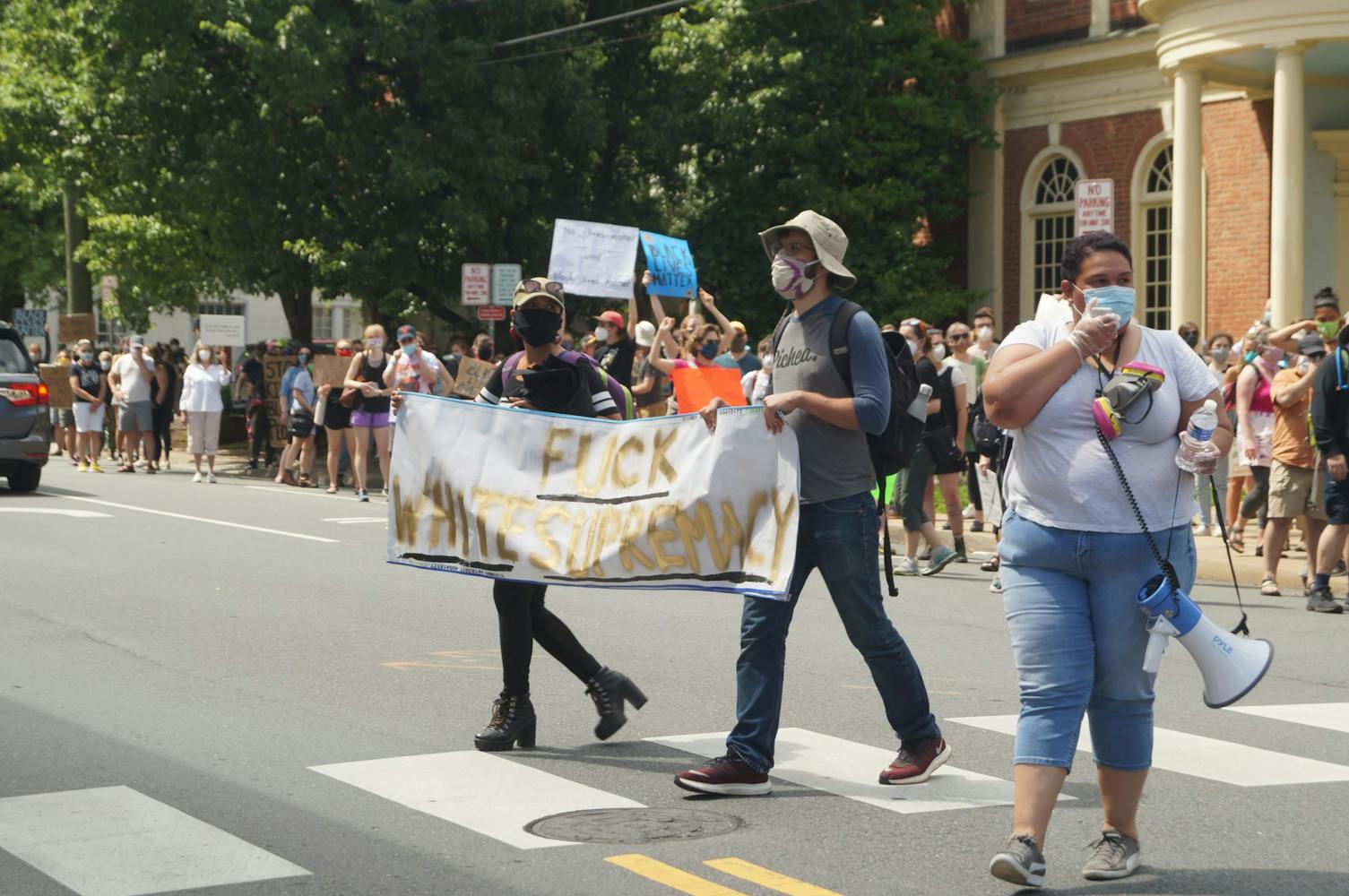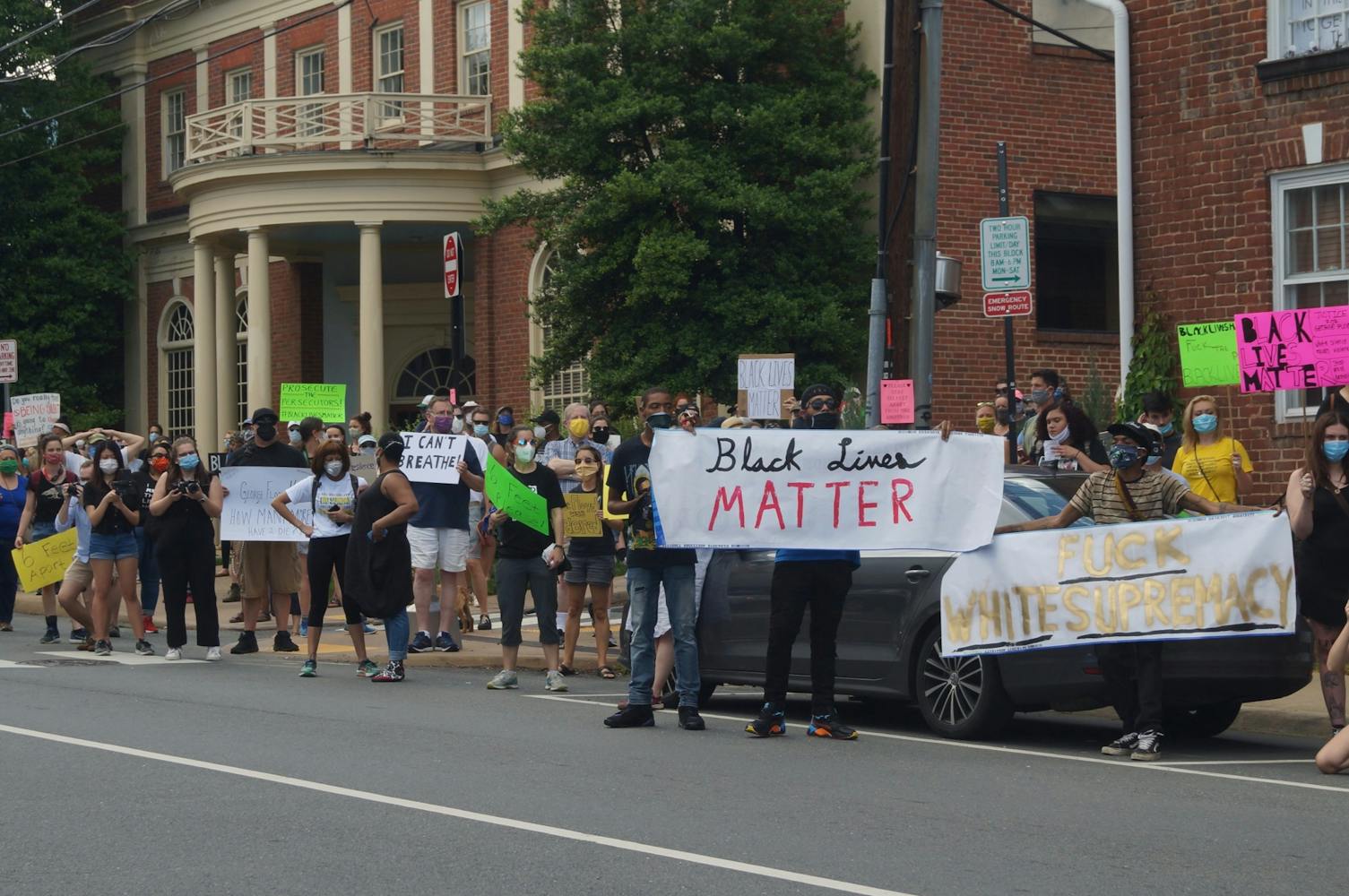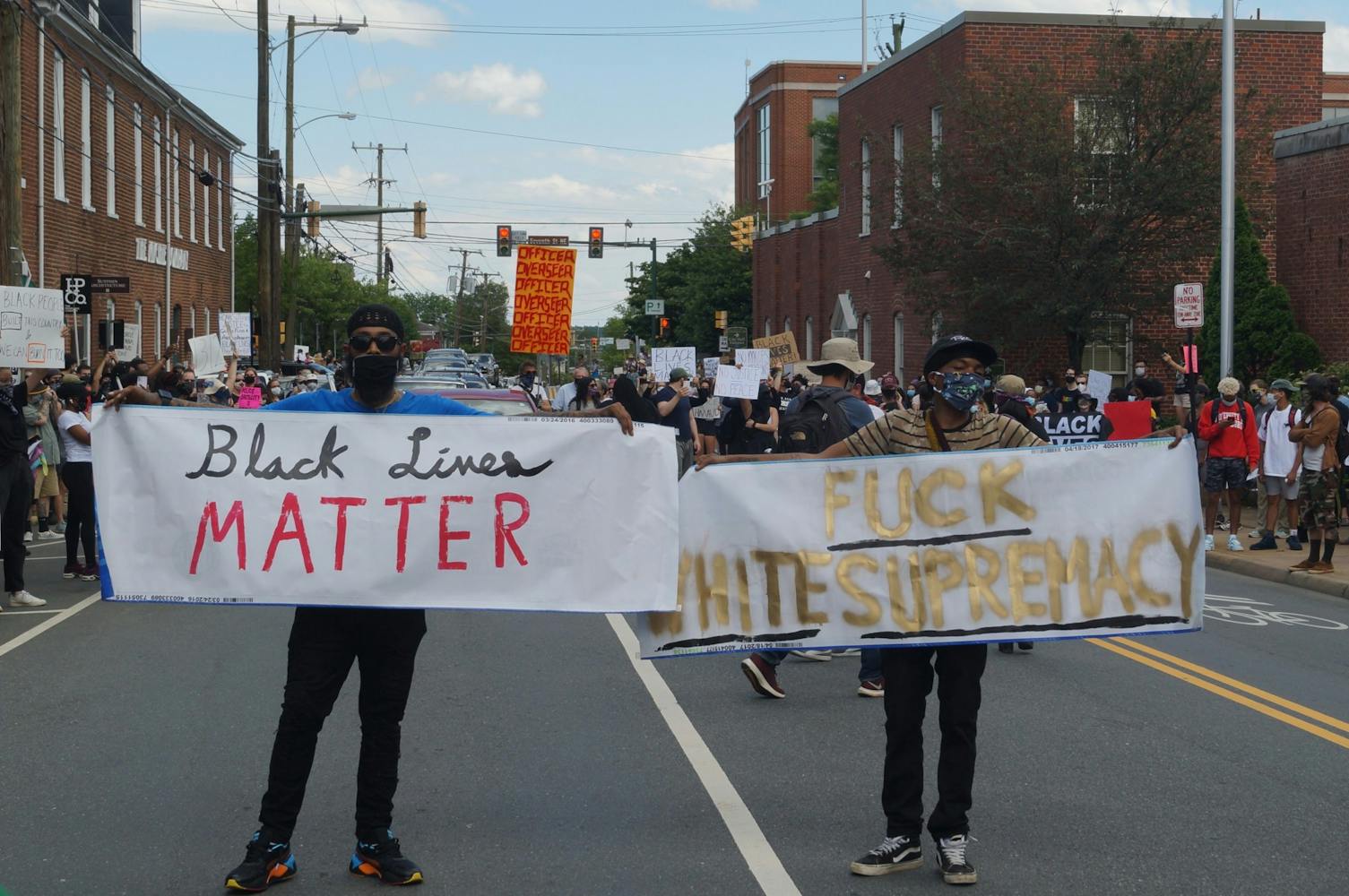Hundreds of people marched through Charlottesville Saturday to protest police brutality in the U.S. following the recent murder of George Floyd — an African American man who died in Minneapolis May 25 after a white police officer knelt on his neck for over eight minutes. In addition to Floyd, protesters also sought to remember the lives of Breonna Taylor — an African American woman who was killed in her apartment in March by Louisville Police during a no-knock warrant — and Sage Smith, an African American transgender woman who went missing in Charlottesville in 2012 and whose case remains unsolved.
The protest in Charlottesville is among the latest in a string of demonstrations condemning the murder of Floyd across the country. No instances of violence were reported in the City Saturday.
Community members gathered near the Charlottesville Police Department in the afternoon holding signs condemning racialized police violence and chanting sayings such as “Black Lives Matter,” “Defund the Police” and “Money for housing and schools, not the police.” Dozens of individuals also participated in the protest in their vehicles by driving down Market Street and honking their horns in support of the demonstration.
The protest moved along Market Street and through the Downtown Mall as the afternoon wore on before reaching Market Street Park — the site of a monument to Confederate General Robert E. Lee and the epicenter of the white supremacist Unite the Right rally in 2017. As demonstrators continued down Market Street and onto Preston Avenue toward Washington Park, the crowd had grown to several hundred protesters, which blocked traffic in both directions for about an hour.
Several community members spoke on the importance and significance of Saturday’s protest to a crowd of several hundred community members in Washington Park — including rising second-year College student and community activist Zyahna Bryant, local activist Rosia Parker and Don Gathers, a community organizer for Charlottesville’s Public Housing Association of Residents.
Gathers said Saturday’s protest sent a powerful message to not only law enforcement and city leaders in Charlottesville, but to police forces around the country.
“Until we change the system that was never built or designed to protect us in the first place … we will continue to have these demonstrations every time we have to,” Gathers said. “This is a revolution. Revolutions continue by staying in someone’s face, and that’s what we need to do as long as we have these terrorist police officers who think it’s open season on black men and women.”
During her remarks, Parker invoked University founder Thomas Jefferson and the University’s role in Charlottesville’s racist past more broadly, reminding the crowd that many of the school’s original structures, such as the Lawn and the Rotunda, were constructed in part by enslaved African American labor.
“We can't live like we used to live, we have to take it back by force,” Parker said. “Black folks built Charlottesville. Thomas Jefferson still thinks he rules this place in his death because U.Va. don't give a damn about us.”
In a press release from the Charlottesville Anti-Racist Media Liaisons Saturday, Bryant said the need to protest in the midst of the COIVD-19 pandemic was telling of how deeply ingrained racism is in the U.S. Although the vast majority of demonstrators wore face coverings during the protest, social distancing became especially difficult as the size of the crowd grew.
“We can no longer afford to just start the conversation,” Bryant wrote. “We have moved past the stages of dialogue. Now is the time for action. We are showing up in solidarity for every Black life that has been taken at the hands of police and other forms of state violence. At the very core of these systems of white supremacy is a desire to control and surveil Black people, but the message from Black people in Charlottesville and all over the nation is that we have had enough.”
In an interview with The Cavalier Daily, Mark Fleming II, a current research resident for the School of Medicine’s Department of Surgery, said Saturday’s protest was a significant statement against racialized police violence in Charlottesville and the nation but added that much more needs to be done. Fleming attended Saturday’s protest and also organized a smaller demonstration of a few dozen protesters Friday at the intersection of Jefferson Park Avenue and University Avenue.
“[It’s significant] everytime we are able to take to the streets and demonstrate our anger and our frustration and our fears and concerns for the black community and the horrors we’ve suffered at the hands of the police and their disregard for our basic human rights,” Fleming said. “We need to do more like this and more than this.”
Fleming said that he hoped he could play a part in amplifying the voices of Bryant and other local activists in the Charlottesville community by protesting, specifically citing the need to continue engaging in direct action not only through demonstrations but also by attending local government meetings and contacting legislators with concerns.
“We can’t stop here, we have to keep fighting, we have to keep acting and reaching out,” Fleming said. “We have to encourage allyship [from our white colleagues] because minorities, people of color, black and brown people — we can't do this by ourselves so we just have to keep acting and can’t let the steam die until we get some justice.”
During an interview with The Cavalier Daily, Charlottesville City Councilor Michael Payne said that while the protest was a part of a broader national movement, it also focused on addressing issues of racial inequality in the Charlottesville community. The CARML press release identified a variety of such local issues including the defunding of the Charlottesville Police Department and a dramatic increase in the number of inmates being released in the area, among others.
“[It’s about] bringing attention to the need to make structural change, to end racist policies in not just policing but housing and the economy as well,” Payne said. “No one really knows exactly what this moment is and what it means so it’s just more important than ever to focus on local communities and making and building change locally.”
Law enforcement personnel were mostly absent during the demonstration, with the exception of directing traffic and closing off roadways to vehicular traffic as protesters marched towards Washington Park on Preston Avenue. In an email to The Cavalier Daily, Charlottesville Police Department spokesperson Tyler Hawn said no one was arrested or detained Saturday as a result of the demonstrations.
In a joint statement Saturday from Albemarle County Commonwealth's Attorney Jim Hingeley and Charlottesville Commonwealth’s Attorney Joe Platania, Hingeley and Platania offered condolences to Floyd’s family and included a statement from University Chief of Police Timothy Longo, who previously served as the Charlottesville Chief of Police from 2001 to 2016.
"The many dedicated men and women who endeavor so faithfully to go about their work in ways that honor their oath and provide good to their communities are now faced with the need to work that much harder in the midst of this pain and widespread turmoil that has come upon us,” Longo wrote. “Each and every day we must set out to do good, to act with measured restraint, to honor our commitment to the Constitutional principles that guide our work, and to always, always, respect the sanctity of human life — no matter what.”
In a Facebook post Sunday, University President Jim Ryan condemned the murder of Floyd and said he understood why many people are angry about his death.
“[Floyd’s] death disturbs, offends, and saddens me deeply as a human being and as an American,” Ryan wrote. “What happened to him obviously deserves to be condemned. And though I cannot walk completely in the shoes of others, it is hardly surprising that people are enraged by this brutal killing, especially coming after the deaths of Ahmaud Arbery and Breonna Taylor—and after two months of a pandemic that has laid bare, yet again, the racial inequities that still pervade our country.”
However, Ryan added that he believed violent protest is unacceptable in addressing such issues.
“At the same time, I don’t believe that violence is ever the answer, and we know that violent protests both backfire and often injure those who are already victims,” Ryan wrote. “I have faith that we, as a country, are better than this. Faith that we, as a country, want to be better than this. And faith that we, as a university, can help get there by being the sort of community we would like to see in the world.”
In a statement released Friday, Charlottesville Mayor Nikuyah Walker condemned law enforcement personnel with regards to Floyd’s murder and police violence across the nation.
“The lynching of George Floyd follows an infinite history of white brutality against Black Lives,” Walker wrote. “From the time that bodies were stolen from the coasts of Africa to present day, white people have failed to see us as human.”
Walker, who first ran for City Council in 2017 on a platform that included police accountability as a major component, added that she plans to continue working toward that goal. Since 2017, Charlottesville has established a Police Civilian Review Board to promote accountability and transparency in the City’s police department, hired its first African American woman — RaShall Brackney — as police chief in 2018 and released the Disproportionate Minority Contact report earlier this year, detailing the extent of of racial disparities in the area’s policing.
“There is nothing just about the devaluation America has placed on Black Lives and the constant danger it puts us in,” Walker wrote. “To my Black people: I see you. I grieve with you. I breathe fear with you. And I will continue to fight for us and demand that white America stop murdering, stealing, and restricting our breaths.”
This article has been updated

